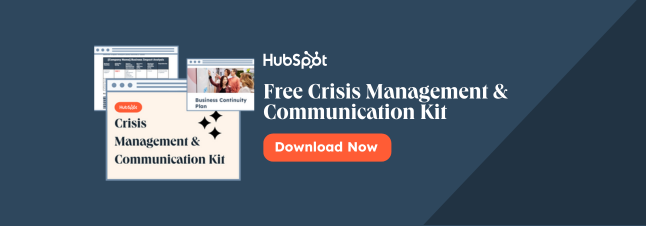Think about a time when crisis management skills might come in handy.
Here's one: Imagine you're in the middle of the ocean on a rowboat. You accidentally drop your paddles into the water. Oh, and there's a small hole in your boat.
Crisis alert.
Without a plan, and the skills necessary to execute that plan, you're going to sink — and fast.
Free Download: Crisis Management Plan & Communication Templates
Let's talk about crisis management skills and why it's important that all business leaders know how to navigate through difficult situations (hypothetically, like this one).
Top 5 Crisis Management Skills
- Communication
- Adaptability
- Emotional intelligence
- Relationship management
- Creativity
When looking at this list, it's no surprise that the top skills for crisis management look a lot like the skills required to be a good business leader. And any good customer service team needs people that embody these values, too.
These skills apply to all different types of crises — from financial to technological.
Now, let's take a look at each skill in more detail.
1. Communication
Have you ever heard of the phrase: communication is key?
This holds especially true when an unexpected problem pops up. In fact, communication is arguably the most important crisis management (and leadership) skill to have.
Suppose your company is facing a cybersecurity threat. To start, you need to keep a clear line of communication open with your IT department.
You should be able to articulate the source of the threat, the severity of the breach, and the resolution status. And, your support reps and employees need to know exactly how to address the crisis with customers.
Speaking of customers, you also need to exchange the pertinent information with them in a timely manner.
In times of crises, customers want to know what's happening. And they want updates on a regular basis. Especially in an instance like this where data security is at stake.
The best leaders are able to communicate calmly, clearly, and concisely regardless of the situation. And they make sure they're communicating with audiences on all the right channels.
2. Adaptability
During an emergency, things can change in an instant. As a leader, you need to be able to change course on a moment's notice.
The COVID-19 pandemic is a great example of an adverse situation that required extreme agility from business leaders. Regulations changed, states shut down, and businesses were forced to operate in completely new ways. Some pivoted to follow health protocols and others took their talents to the digital space.
Things don't always go as planned, and that's OK. You just have to be prepared to fine-tune your management strategy and customer service approach along the way.
3. Emotional Intelligence
When employees are in a high-stress situation, the last thing they need is a leader who is visibly anxious and confused.
Let's say your organization is dealing with a financial crisis. Chances are emotions are running high across the company. Your employees may be worried about job security. Investors are likely concerned about their returns. And customers could be feeling uneasy about continuing to do business with you.
Good managers are able to acknowledge other people's emotions and use that information to make sound decisions, and communicate, accordingly.
4. Relationship Management
There are many stakeholders involved in crisis management, so business leaders need to be able to maintain relationships with different groups of people.
If you're dealing with an incident related to business laws and practices, you need to coordinate with your legal team. Or, if it's a personnel crisis, you'll need to work closely with your HR team.
Regardless of the type of crisis, it's always important to stay connected with your customer service team. Your support reps are at the front lines of customer communication. They should be able to rely on leadership to provide guidance on how to keep customers informed.
5. Creativity
When a crisis hits, say goodbye to business as usual. Good crisis management requires out-of-the-box thinking and creative solutions.
Take our earlier crisis — the one where we're stranded on a sinking boat with no paddles. Is there anything we can use to replace the paddles? Maybe there's something in the boat that can function the same. Or, we could try to use an article of clothing or other object to temporarily plug the leak.
Either way, keep in mind that more heads are better than one when it comes to innovative thinking. Strong leaders know how to leverage the diverse knowledge and talents of the people around them to overcome obstacles.
Why Crisis Management Skills Are Important
Crises can happen at any time, and leaders must have the skills to react appropriately.
The net of it is, bad crisis management ultimately impacts how customers perceive your brand. If your company is non-communicative and disorganized when disaster strikes, customers will pick up on that.
People want to be able to trust and have confidence in your business. And a big part of that trust comes from the honesty and transparency you put forward during times of uncertainty.
On the other hand, crisis management skills are also important when planning for a crisis — not just when the problem is already underway.
Crisis Management Leadership
- Assess the situation.
- Consult with internal stakeholders.
- Act quickly, but thoughtfully.
- Remain compassionate.
- Present perspective.
- Set clear expectations.
- Stay adaptable.
- Conduct a retrospective.
The eight most important steps for leading in a crisis are outlined in the graphic below.

We'll walk through each step together.
1. Assess the situation.
Figure out exactly what's going on. Identify the type of crisis, the source of the problem, and the impact that crisis will have on your business. Consider what your customers need to know about the situation and how they will feel once the information is shared.
2. Consult with internal stakeholders.
Decide which major players in your organization need to be involved. Determine which team is most affected by the crisis and who can help solve it. Be sure to keep them looped into all subsequent communications.
3. Act quickly, but thoughtfully.
Don't let too much time pass between the onset of the crisis and your first plan of attack. Take enough time to think through the implications of your actions, but try to get ahead of the problem before it gets out of control.
4. Remain compassionate.
Even though you're acting quickly, you should still be leading from a place of compassion. This is where emotional intelligence kicks in. Things are tense. Take a step back and acknowledge that everyone is doing the best they can given the circumstances.
5. Present perspective.
Customers want to hear about the severity of the crisis from your point of view. Give them insight into how the crisis will affect your business in both the short and long term. And, make sure all internal parties are aligned on how to disseminate this information to external stakeholders.
6. Set clear expectations.
As you communicate with your internal teams, let them know exactly what you need from them and when. Also, make sure you articulate the implications of the crisis — and the estimated time to resolution — to your customers with clarity and full transparency.
7. Stay adaptable.
Adaptability is near the top of our crisis management skills list, and it's important to remain nimble during troubling times. You may have put a plan in motion with clear expectations, but it's subject to change as you work through the issues.
8. Conduct a retrospective.
Once the crisis begins to subside, you can start evaluating how you handled the situation. What went well? What would you do differently next time? Document any insights or best practices and weave them into your crisis management plan.
Crisis Management Skills Examples
While there are several famous crisis communication examples out there, let's take a look at what crisis management skills may look like in practice.
Good Crisis Management Skills Examples
Example #1:
A tornado damages a small personal training facility, and the business is forced to close down for at least a few months. The owner visits the gym, assesses the damage, and realizes they need to pivot their business model in the short term.
They quickly send out an email to all of the trainers and staff detailing the remote work policies and protocols for virtual workout sessions over the next 90 days.
Customers are notified about the gym closure via email, social media, and the website. They are also offered the opportunity to take virtual classes and can sign up to be notified when the gym reopens.
What went well: The business owner was adaptable. They came up with a creative way to keep the business up and running through virtual offerings. There were open lines of communication between management and employees. And, the business owner was able to maintain relationships with their customers despite the gym closure.
Example #2:
A lawsuit has been filed against a skincare brand. A customer claims a moisturizer caused an adverse reaction on their skin. Management reviews the claim, considers their options, and decides to temporarily recall the product to conduct additional research and testing.
The company is providing regular updates to both employees and customers about how they are dealing with the issue.
Luckily, the adverse reaction appears to have been an independent case. The company re-releases the moisturizer with an updated label containing more details on the potential side effects.
What went well: By recalling the product, the brand acted with emotional intelligence toward their customers — especially the one who made the claim. Their decision to research the issue showed they care about the welfare of the people buying their products. They also communicated with transparency and honesty about how they handled the situation.
Bad Crisis Management Skills Examples
Example #1:
There's an emergency situation unfolding right around the corner from a public relations agency in the city. It starts happening during morning commute hours, and employees are unsure if they should come to work.
The leadership team was in the office early for a meeting, so they've been radio silent on the matter.
Due to lack of communication, some people come into work and risk putting themselves in a dangerous environment. Managers are annoyed at the employees on their team who decided to stay home. Staff members begin to reevaluate their decision to work at the agency.
What could be improved: Communication is especially important during an emergency. The leadership team should've given employees information about the office status as soon as possible. Managers should have also been more compassionate and understanding toward the employees who decided to work from home for safety reasons.
Example #2:
Due to an accounting error, a technology company has to make budget cuts to avoid bankruptcy. Rather than meeting with the accounting team to discuss budgetary options, management acts in a haste.
They begin cutting department budgets and laying people off.
Former employees are upset and confused about the layoffs. Current employees are worried about job security. Clients are frustrated and unable to reach their designated support reps due to the cuts and, eventually, begin to churn.
What could be improved: Management had a poor display of all five crisis management skills. They had the opportunity to adapt with the changes and come up with creative solutions to address the budget cuts. They should have proactively communicated with employees and clients about potential cutbacks and layoffs. Management also needed to consider how their actions would affect people's emotions and the relationships involved.
A crisis can come in an instant. And regardless of how long it lasts, the long term impacts for your business are inevitable.
A good boat captain — I mean, leader — is prepared and equipped with the skills to weather the storm. Or, at least open to changing their perspective and switching gears along the way.




![De-Escalation Techniques: 30 Proven Strategies to Diffuse Tension and Build Trust [Expert Tips + Data]](https://www.hubspot.com/hubfs/de-escalation-techniques_2.webp)




![My Tips for Social Media Crisis Management [Free Template]](https://www.hubspot.com/hubfs/social-media-crisis-management-1-20241107-3106355.webp)

